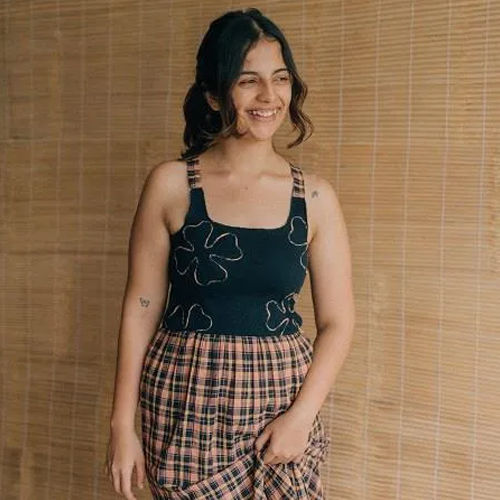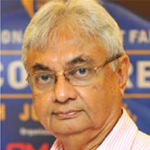Sayukta Chawla
Founder and CEO
Label Sugar
We have plans to explore more in accessories category
Inspired by the Indian crafts, Label Sugar is a womenswear brand offering timeless bohemian clothing. Striving to create new and contemporary clothing from traditional techniques of weaving, embroideries & sketching, the label sources its textiles from across India and produces locally. Moreover, being a ‘made to order’ brand, helps it to largely minimise its waste since there is no overproduction nor any risk of excess stock going to the landfill. Speaking to Fibre2Fashion, Label Sugar Founder and CEO Sayukta Chawla talks about her inspiration, collections, Indian consumer and future plans.
Fibre2Fashion: How did you come up with the idea for Label Sugar?
Sayukta Chawla:
I grew up surrounded by the Indian fashion industry because of my mother. And hence, I have also been fond of Indian crafts and textiles. I had the luxury to get my clothes customised with a western touch by the tailors at my mother’s workshop for everyday wear, and not just limit the usage of Indian fabrics to wedding wear. My outfits weren’t just loved by my friends in school in India, but they were adored by even strangers on the streets outside India when I was pursing Fashion studies in Canada. Which is when I realised that there was huge gap in the market for bohemian clothing for the younger generation. Indian fabrics are majorly used for Indian silhouettes such as kurtas, lehengas, etc, and while its beautiful, it’s not very usable for casual wear. In addition, the younger generation’s style is more westernised, for example dresses, crop tops, skirts, etc. Label Sugar was born upon this need of understanding the style of today’s youth along with keeping the Indian roots alive.
F2F: Why the name Sugar?
SC:
Sugar was my first dog’s name. Just like her, Label Sugar is my second baby. The name is something people can also relate to, to be recognised as a brand and not as just a designer.
F2F: Tell us a little bit about the brand’s journey since its inception.
SC:
It has been a beautiful journey since I founded Label Sugar in 2018 from a small flea market and my mother’s store. I was just 20 then and didn’t really have a proper business plan, or anything legally binding at that point of time. The first collection was simply an outcome of love of designing. I still remember putting the designs up on the flea market and being sold out on the first day! It’s still the happiest moment I have had since I started Sugar; customers coming back to the stores asking for Sugar even after the flea was over. Since then, I have never looked back, and made Label Sugar a real brand and gave my heart and soul to it. We also had a lot of ups and downs, but each time there was a new learning out of it. We are now a beautiful community of 20,000 on social media as well, which keeps us going.
F2F: What are your collections inspired by?
SC:
My collections are usually inspired by the fabrics itself. My very first collection was ‘hand embroidery’, where I experimented with detailed embroidery done on ‘khat work’. Similarly, other collections like ‘postcards from jaipur’, ‘baandhani’, and ‘khadi’—all were embracing the fabric itself in different forms of silhouettes. However, it is also not limited to the same. Collections like ‘goan summer’, ‘road to romance’, and ‘swim’ are curations of florals, solid and prints inspired by the beauty of summer.
F2F: What kind of Indian fabrics, and trims and accessories do you largely work with?
SC:
Majority of my fabrics are all handloom fabrics. The feeling of a hand-made fabric adds so much more to a garment than one can understand. Other than that, we use accessories like kodhis, ghugroos, beads, cute buttons, or anything bohemian that adds an aesthetic to our designs.
F2F: How conscious is the Indian consumer when it comes to fashion?
SC:
A few years back, I would have probably said zero per cent, but today, consumers are aware. Today’s generation has become very specific about their shopping habits, where they buy from, how sustainable the brand is, etc. However, there is still a large number of people in India, who only see the price and design at the end of the day.
F2F: Which points of sales are performing well?
SC:
In-store sales and exhibitions are our main source of sales since day 1. However, online sales have been increasing after COVID-19 and there is also more brand awareness.
F2F: What kinds of Indian textiles do you plan to weave into your collection going forward?
SC:
We are currently working with organic knit jersey fabric for our upcoming collection. And we are looking forward to finding better sustainable sources for recycled denim fabric.
F2F: Do you have plans to get into kidswear or any new product categories? Please share some of your future plans.
SC:
We have plans to explore more in accessories category. Our bucket hat is one of our best sellers. Having more accessories like jewellery, footwear, bags is something that can be great for Sugar. We want Label Sugar to be one stop destination for customers to complete their look.



20230103183907.png)

_8.JPG)








